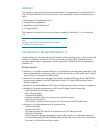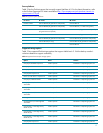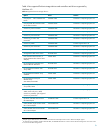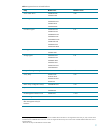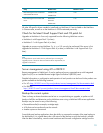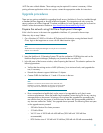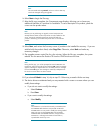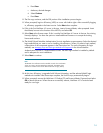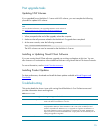
Abstract
This integration note provides requirements and guidelines for upgrading from Novell NetWare 5.1
and 6 to Novell NetWare 6.5 on ProLiant servers. More specifically, we discuss the following four
topics:
• Enhancements of Novell NetWare 6.5
• Comprehensive upgrade plan
• Upgrading to Novell NetWare 6.5
• Post upgrade tasks
This integration note specifically covers an in-place upgrade from NetWare 5.1 or 6 to NetWare
6.5.
Note
HP highly recommends that you read this integration note before
proceeding with the upgrade process.
Introduction to Novell NetWare 6.5
Novell NetWare 6.5, the latest release of the NetWare 32-bit operating system, is built on the Novell
NetWare 6 code base. NetWare 6.5 focuses on the end user by providing OneNet access from
anywhere and any device. Applications currently supported on NetWare 6 are also supported on
NetWare 6.5.
Enhancements
• NetWare 6.5 provides increased stability for its Virtual Machine subsystem and greater than 4 GB
Memory (Extended Server Memory) support, such that memory above 4 GB can be used by the file
system (NSS) for swap-space and data caching.
• NetWare 6.5 provides improved Legacy-Free support, including USB Floppy Drive, USB CDROM
(except during installation), and USB Specification version 2.0 support (USB Keyboard/Mouse
already supported).
• NetWare 6.5 provides additional ACPI support including thermal, device and power management.
• NetWare 6.5 provides enhancements to NSS (Novell Storage Systems) that provide:
– MPIO (Multi-Path Input/Output) Support
– NFS Locking Interfaces
– Volume-level Snapshots
– Pool-level Snapshots (Allows for pool quiesce for block-level copies)
– Volume Split/Volume Move
– CIFS Junctions (Volume junctioning support for CIFS protocols and CIFS-based clients)
• NetWare 6.5 provides enhancements for system backup:
– Pool-Level Snapshots
– Cluster Failover API’s
– Throughput Increase (800 MB/sec to local tape device, 600 MB/sec remote)
– eDirectory Hot Backups
– HSM (Hierarchical Storage Management) Support (Allows near-line or off-line data migration)
– Serverless Backup APIs (All data, metadata and controller data reside on the SAN, removing the
LAN and/or WAN as the transmission media
2




